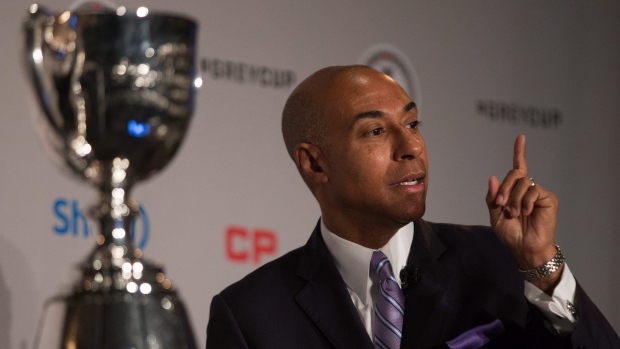Apr 12, 2017
CFL's challenges extend well beyond its search for a new commissioner
As TSN's Gary Lawless and Dave Naylor write, the league still faces hurdles from both the commissioner's chair and from the club level.

Jeffrey Orridge didn’t come across as someone with a deep love for the three-down game over which he served as commissioner.
He wasn’t well steeped in CFL lore. He didn’t know his Mosca from his Cahill.
That was true the day he was hired and that was still his image on the day he and the CFL agreed to part ways, less than two years after his arrival.
He wasn’t a good fit, which should have been obvious to anyone who watched his State of the League address prior to the 2015 Grey Cup game, when he showed a poor understanding of even the league's most obvious challenges.
Commissioners in sports are held up as if they have magical powers but the fact is, the list of what they do is pretty simple. They oversee the negotiation of labour deals with their players and broadcast contracts with TV partners. They ensure that teams satisfy operational standards, develop league business partners and they are responsible for the integrity of the game.
They must also present a vision to prevent their leagues from being overtaken by other forms of sports and entertainment.
That's it, really.
But accomplishing those things is impossible when your owners don't believe in your ability to represent them and their interests. Which is where Orridge found himself with the CFL's board of governors.
The scenario is hardly new for the CFL, as anyone knows who has followed the league over the past 30 years.
And that speaks to the difficulty of governing a league where losing three of nine votes puts you in jeopardy of losing your job and where the interests of the various clubs have only so much in common.
Orridge may have been the wrong guy for the job, but that doesn't make his frustrations as he exits any less legitimate than those of any of his predecessors.
And moving him out of the commissioner’s office doesn’t cure the CFL of the ailments draining its lifeforce these days.
So, as much as the board needs to focus on who is standing at the end of the table, it also needs to look in the mirror.
The good news on that front is the board has lots of new blood and progressive thinkers right now. Jeff Hunt in Ottawa, Wade Miller in Winnipeg, Dale Lastman in Toronto, Scott Mitchell in Hamilton, Wayne Morsky in Saskatchewan, Len Rhodes in Edmonton and Ken King in Calgary make up a strong collection of football and business minds. They’re passionate about the CFL and for the most part this is a group which puts the league ahead of individual club interests. They have varied talents and are focused on building together rather than weakening one another.
They fumbled on Orridge. He was not the right guy. They weren't comfortable with him as the face of the Canadian Football League.
But while much of the CFL conversation over the coming months is sure to focus on the search for the next commissioner, it's worth noting that the most serious issues confronting the CFL these days are at the club level.
And until there's stability and ultimately growth in sagging markets such as Toronto, Montreal and Vancouver, whoever sits in the chair Orridge is about to vacate won’t be able to lead the CFL in new directions both innovative and profitable.
A commissioner can’t legislate a new stadium in Calgary which is required to move the Stampeders forward in a competitive entertainment marketplace.
He can’t pry the keys away from David Braley in B.C. The Lions need new ideas, new resources and new ownership.
He's not responsible for reconnecting with the Francophone fan base in Montreal that once flocked to games but has now gone stale on the Alouettes.
And no one person in the league office can instantly reverse 30 years of decline in the Toronto Argonauts brand, beyond ensuring the league is in position to capitalize when and if new ownership turns things around at BMO Field.
No league can reach its potential when it's constantly changing leadership, tossing away visions, strategic plans and relationships. That's been the CFL story since Jake Gaudaur retired after 16 years in 1984.
But there’s no magic wand the league office can wave, either. Teams have to run their own business and be responsible for infrastructure and financial viability. Those are the legs of the chair any commissioner must sit on.
The board now needs to find someone else to sit in the chair.
But even if the next commissioner is the right guy, the stability of his chair still rests on the success of the teams represented at his table.

